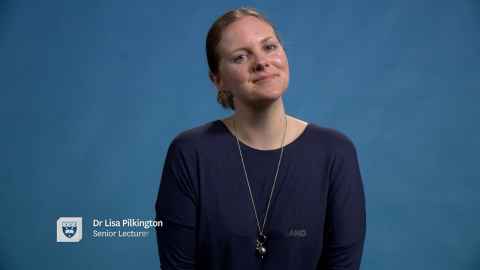Programme overview
Chemistry is at the foundation of the modern world. Everything that we eat, use and wear is made possible through modern chemistry.
This degree will offer the students the chance to further their chemistry knowledge and learn from experts in the field. The specialisations in analytical chemistry and materials science focus on real world applications of chemistry.
The specialisations are designed to equip students with skills that will allow them to both progress their research study and make them job-ready.
Programme structure
The MChem is an 18-month, 180-point programme which is completed over three semesters full-time, with part-time options available.
Over the course of their degree, students will take either eight 15-point courses and a 60-point Research Dissertation or ten 15-point courses and a 30-point Research Project. The research component of the degree will be carried out in the later semester(s), along with the chosen papers.
There are two specialisations. The Analytical Chemistry specialisation specifies two analytical courses (CHEM 740 and CHEM 741) while the course options include courses that apply analytical chemistry in other fields. The Materials Science option specifies courses in Physical Chemistry and Materials Science from both the School of Chemical Sciences (CHEM 710, CHEM 712 and CHEM 780) and the Department of Chemical and Materials Engineering (CHEMMAT 724 and CHEMMAT 725).
You'll also need to meet other requirements, including time limits and total points limits. See Postgraduate enrolment.
Subjects available in this programme
- Analytical Chemistry
- Chemistry
- Materials Science
2025 entry requirements
My highest qualification is from:
Programme requirements
Minimum programme requirements
Minimum requirements listed here are the likely grades required and do not guarantee entry. We assess each application individually and applicants may require a higher grade to be offered a place.
-
Study optionTaught 180 pointsGrade requiredGPA Grade Point Average 4.0
Further programme requirements
Taught 180 points
You must have completed a Bachelor of Science in a relevant major with a Grade Point Average of 4.0 in 60 points above Stage II.
Or, alternatively, have completed a Bachelors degree and passed at least 60 points towards the Postgraduate Diploma in Science with a GPA of 4.0, and a specialisation in Chemistry (provided that the postgraduate diploma has not been awarded).
Relevant majors include chemistry, medicinal chemistry, green chemistry, food science, chemical engineering, and materials engineering.
Other pathways to study
If you do not meet the GPA requirement, you can still gain entry by passing 60 points towards a Postgraduate Diploma in Science in Chemistry with a minimum 4.0 GPA.
If you do not meet the above entry requirements, but have other relevant experience and think you would be successful in postgraduate study, please contact us to discuss alternative pathways into our programmes.
Programme requirements
Minimum programme requirements
Minimum requirements listed here are the likely grades required and do not guarantee entry. We assess each application individually and applicants may require a higher grade to be offered a place.
-
Study optionTaught 180 pointsGrade requiredGPE Grade Point Equivalent 4.0
Bachelor of Science or Bachelor of Engineering in a relevant subject
-
QualificationIELTS Academic International English Language Testing SystemScore required6.5
No bands below 6.0.
Further programme requirements
Taught 180 points
You must have completed an undergraduate degree in a relevant subject at a recognised university (or similar institution) with a GPE of 4.0.
Relevant majors include chemistry, medicinal chemistry, green chemistry, food science, chemical engineering, and materials engineering.
How much does a Master of Chemistry cost per year?
2025 fees
- Domestic students
- NZ$10,892.40*
- International students
- NZ$52,842*
Fees are set in advance of each calendar year and will be updated on this website. Fees are inclusive of 15% GST, but do not include the Student Services Fee, course books, travel and health insurance, or living costs. Amounts shown are indicative only. In addition to the tuition fees, there is a Student Services Fee of $9.24 per point, estimated at $1,108.80 for full-time study (120 points). Fees will be confirmed upon completion of enrolment into courses.
*Please note: amounts shown are indicative and estimates only.
Find out about financial support information
Scholarships and awards
Find out about the scholarships you may be eligible for.
Student loans and allowances
Are you a New Zealand citizen or resident? You could be eligible for a student loan or allowance.
Cost of living
Get an idea of how much accommodation and general living in Auckland will cost.
Key dates
Note: For international applicants, the application closing date for Semester Two 2024 is 24 May 2024.
Please note: We will consider late applications if places are still available. International students should start the application process as early as possible to allow sufficient time to apply for a visa.
Application closing dates
- Semester One 2025
- 8 December 2024
- Semester Two 2025
- 4 July 2025
Start dates
Here are the start dates for the programme.
| Semester One | Starts – 3 March |
|---|---|
| Ends – 30 June | |
| Semester Two | Starts – 21 July |
| Ends – 17 November |
| Semester One | Starts – 2 March |
|---|---|
| Ends – 29 June | |
| Semester Two | Starts – 20 July |
| Ends – 16 November |
Other important dates
See important dates for the academic year, including orientation, enrolment, study breaks, exams, and graduation.
Analytical Chemistry specialisation
45 points:
CHEM 740 Current Topics in Analytical Chemistry
CHEM 741 Chemometrics and Quality Assurance in Chemistry
CHEM 795 Research Methods in Chemistry
30 points from:
FOODSCI 706 Food Safety
FOODSCI 740 Food Analysis
FORENSIC 703 Statistics and Molecular Biology for Forensic Science
FORENSIC 704 Techniques and Applications for Forensic Science
At least 30 points from:
CHEM 710 Advanced Physical Chemistry
CHEM 712 Nanomaterials and Nanotechnology
CHEM 720 Advanced Inorganic Chemistry
CHEM 730 Modern Methods for the Synthesis of Bioactive Molecules
CHEM 735 Advanced Medicinal Chemistry
CHEM 738 Biomolecular Chemistry
CHEM 750 Advanced Topics in Chemistry 1
CHEM 760 Advanced Green Chemistry
CHEM 780 Advanced Materials Chemistry
Up to 15 points from other 700 level courses offered at this University approved by the Academic Head or nominee.
And either:
30 points: CHEM 791 Research Project
+ another 30 points from CHEM 710, CHEM 712, CHEM 720, CHEM 730, CHEM 735, CHEM 738, CHEM 750, CHEM 760, CHEM 780
or
60 points: CHEM 794 Dissertation
Materials Science specialisation
90 points:
CHEM 710 Advanced Physical Chemistry
CHEM 712 Nanomaterials and Nanotechnology
CHEM 780 Advanced Materials Chemistry
CHEM 795 Research Methods in Chemistry
CHEMMAT 724
CHEMMAT 725
At least 15 points from:
CHEM 720 Advanced Inorganic Chemistry
CHEM 730 Modern Methods for the Synthesis of Bioactive Molecules
CHEM 735 Advanced Medicinal Chemistry
CHEM 738 Biomolecular Chemistry
CHEM 740 Current Topics in Analytical Chemistry
CHEM 741 Chemometrics and Quality Assurance in Chemistry
CHEM 750 Advanced Topics in Chemistry 1
CHEM 760 Advanced Green Chemistry
Up to 15 points from other 700 level courses offered at this University approved by the Academic Head or nominee
And either:
30 points: CHEM 791 Research Project
+ another 30 points from CHEM 720, CHEM 730, CHEM 735, CHEM 738, CHEM 740, CHEM 741, CHEM 750, CHEM 760
or
60 points: CHEM 794 Dissertation
Non-specialisation
15 points: CHEM 795 Research Methods in Chemistry
30 points from:
CHEM 712 Nanomaterials and Nanotechnology
CHEM 740 Current Topics in Analytical Chemistry
CHEM 741 Chemometrics and Quality Assurance in Chemistry
CHEM 780 Advanced Materials Chemistry
At least a further 60 points from:
CHEM 710 Advanced Physical Chemistry
CHEM 720 Advanced Inorganic Chemistry
CHEM 730 Modern Methods for the Synthesis of Bioactive Molecules
CHEM 735 Advanced Medicinal Chemistry
CHEM 738 Biomolecular Chemistry
CHEM 750 Advanced Topics in Chemistry 1
CHEM 760 Advanced Green Chemistry
Up to 15 points from other 700 level courses offered at this University approved by the Academic Head or nominee
And either:
30 points: CHEM 791 Research Project
+ another 30 points from CHEM 710, CHEM 720, CHEM 730, CHEM 735, CHEM 738, CHEM CHEM 750, CHEM 760
or
60 points: CHEM 794 Dissertation
Where could this programme take you?
The MChem will prepare students for careers in chemistry laboratories in private companies or government laboratories, as well as chemistry-related careers. Selected students can also proceed to advanced research degrees. The Analytical Chemistry and Materials Science specialisations particularly focus on building skills needed for current commercial laboratory chemistry roles.
Jobs related to this programme
- Chemical Analyst
- Materials Analyst
- Quality Assurance
- Materials Research
- Sensor development
- Science teacher
- Research chemist
Student career planning service
Once you become a student at the University, you can get help with planning and developing your career from Career Development and Employability Services.
Experience the University

Master of Chemistry
Find out more about the Master of Chemistry programme with Senior Lecturer Dr Lisa Pilkington.
Do you need help?
Can’t find the answer in AskAuckland?
Need to speak to someone?
You can phone us directly.
- Auckland
- 923 5025
- Outside Auckland
- 0800 61 62 63
- International
- +64 9 373 7513


